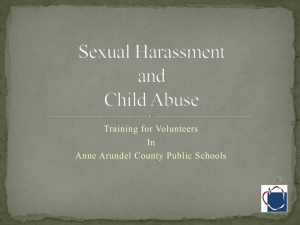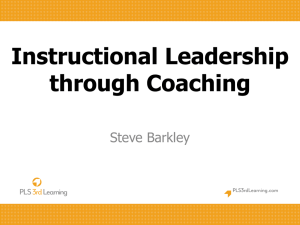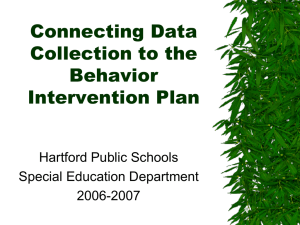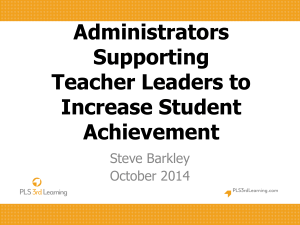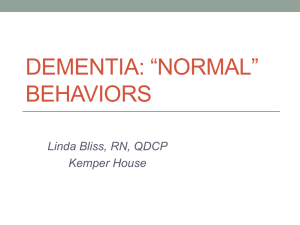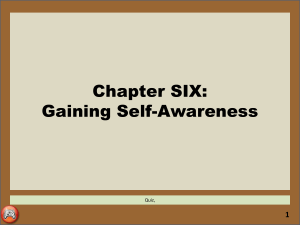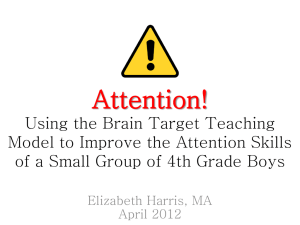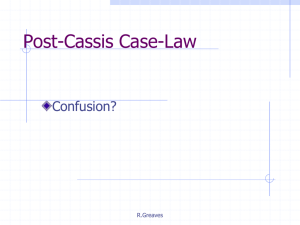Dealing With Difficult People-Ray
advertisement
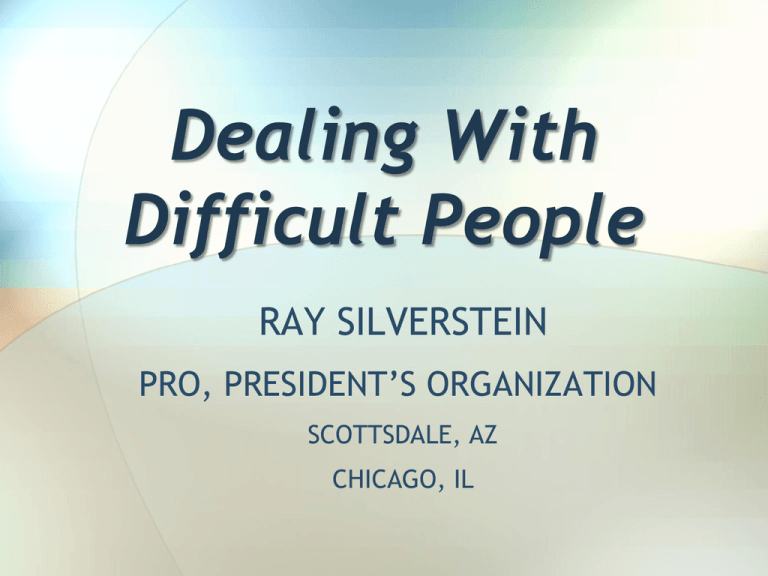
Dealing With Difficult People RAY SILVERSTEIN PRO, PRESIDENT’S ORGANIZATION SCOTTSDALE, AZ CHICAGO, IL INFORMATION RESOURCES EXPERIENCE, FACILITATION & OBSERVATION OF WORKING WITH BUSINESS OWNERS IN PEER ADVISORY BOARDS “DEALING WITH PEOPLE YOU CAN’T STAND” Dr. Rick Brinkman & Dr. Rick Kirschner TTI SUCCESS INSIGHTS EMOTIONAL INTELLIGENCE 2.0 Travis Bradberry & Jean Greaves Objectives 1. Understand Yourself 2. Understand Others 3. More Productive Workplace “As charming as we think we are there is someone who can’t stand being around us!” Dr. Rick Brinkman & Dr. Rick Kirschner “Personal competence is your ability to stay aware of your emotions and manage your behavior and tendencies” Travis Bradberry & Jean Greaves MINIMIZE WORKPLACE TRAUMA • HIRE MORE EFFECTIVELY: VALUES, VISION, CULTURE AND COMMUNICATION • EMOTIONAL INTELLIGENCE: EQ • PERSONALITY ASSESSMENTS: DiSC AND OTHER TOOLS HIRE MORE EFFECTIVELY • MATCH VALUES • AGREE ON EXPECTATIONS – DEFINE WHAT IS A GOOD JOB AND HOW THEIR POSITION HELPS FULFILL THE CULTURE AND BUSINESS GOALS • COMPLEMENT GOOD WORK AND DISCUSS LEARNING OPPORTUNITY UNDERSTANDING YOURSELF “SELF-AWARENESS is not about discovering deep, dark secrets and unconscious motivations, but rather, it comes from developing a straightforward and honest understanding of what makes you tick.” Travis Bradberry & Jean Greaves EMOTIONAL INTELLIGENCE Emotional intelligence is your ability to recognize and understand emotions in yourself and others, and your ability to use this awareness to manage your behavior and relationships. People with average EQ’s out perform people with high IQ’s 70% of the time. There is No known connection between IQ and EQ. IQ and Personality are stable over a lifetime. PERSONAL COMPETENCE = SELF AWARENESS, SELF MANAGEMENT SOCIAL COMPETENCE = SOCIAL AWARENESS, RELATIONSHIP MANAGEMENT PERSONAL COMPETENCE SELF-AWARENESS—Is your ability to accurately perceive your own emotions in the moment and understand your tendencies across situations. A high degree of self-awareness requires a willingness to tolerate the discomfort of focusing on feelings that may be negative. This is a foundational skill. When you have it, it makes other emotional intelligence skills much easier to use. SELF-MANAGEMENT---Is what happens when you act, or do not act. It is dependent on your self-awareness. Understanding Others SOCIAL COMPENTENCE • SOCIAL-AWARENESS—Is your ability to accurately pick up on emotions in other people and understand what is really going on with them. Listening and observing are the most important element of Social Awareness. This is a foundational skill. • SELF-MANAGEMENT --- Is what happens when you act or do not act. Self-Management is your ability to use your awareness of your emotions to stay flexible and direct your behavior positively. • Success comes to those who can put their needs on hold and manage their tendencies. “Conflicts at work tend to fester when people passively avoid problems, because people lack the skills to initiate a direct, yet constructive conversation.” Travis Bradberry & Jean Greaves Problems are like old sweat socks in a locker. They do not improve with age. D is for Dominant • Demanding • Determined • Egocentric • Aggressive • Driving • Competitive • Ambitious • Decisive • Pioneering • Venturesome • Strong-Willed• Inquisitive • Forceful • Responsible I is for Influence • Effusive • Warm • Inspiring • Convincing • Magnetic • Polished • Political • Poised • Enthusiastic • Optimistic • Demonstrative • Trusting • Persuasive • Sociable S is for Steadiness • Possessive • Phlegmatic • Predictable • Relaxed • Consistent • Resistant to Change • Deliberate • Non demonstrative • Steady • Passive • Stable • Patient C is for Compliance • Evasive • Open-Minded • Worrisome • Balanced Judgment • Careful • Diplomatic • Dependent • Systematic • Cautious • Neat • Conventional • Accurate • Exacting • Tactful Representation of Theory Responses to Conflict Lens of Understanding C D S I D BEHAVIORS HOSTILE-AGGRESSIVE BEHAVIORS: GET IT DONE! “If you need to get it done, you focus on the task at hand. Any awareness of people is peripheral or unnecessary to accomplishing the task. You tend to speed up…, to act…, to assert… You may even become careless and aggressive.” D Behaviors HOSTILE-AGGRESSIVE BEHAVIORS: GET IT DONE! • Sniper • Know-It-All (The Expert) • Tank SNIPER Whether through rude comments, biting sarcasm, or a well timed roll of the eyes, making you look foolish is the Sniper’s specialty. ACTION PLAN • • • • STOP, LOOK, BACKTRACK USE SEARCHIGHT QUESTIONS GO ON A GRIEVANCE PATROL SUGGEST A CIVIL FUTURE D’s Value to the Team • Bottom line organizer • Self Starter • Forward Looking • Initiates Activity • Tenacious • Innovative • Challenges Status Quo D’s Limitations • Task oriented • Too Direct • Impatient with others • Argumentative • May not listen well • Take on too many tasks • Push rather than lead • Lack tact and diplomacy • May overstep authority Lens of Understanding C D S I I Behaviors GET APPRECIATED “The desire to contribute to others and to be appreciated for it is one of the most powerful motivational forces known.” I Behaviors GET APPRECIATED • Exploder (Grenade) • Think They Know-It-All • Sniper Think They Know It All • The Think-They-Know–It-Alls can’t fool all of the people all of the time, but they can fool some of the people enough of the time, and enough of the people all of the time---all for the sake of getting some ACTION PLAN • GIVE THEM A LITTLE ATTENTION • CLARIFY FOR SPECIFICS • TELL IT LIKE IT IS • GIVE THEM A BREAK • BREAK THE CYCLE I’s Value to the Organization • Optimistic and Enthusiasm • Creative Problem Solving • Motivates others • Positive Sense of Humor • Team Player • Negotiates Conflict • Verbalizes and is articulate I’s Limitations • Oversell • Tends to over trust • Inattentive to detail • Situational listener • Impulsive, heart over mind • Unrealistic expectations of ability to influence others • Difficulty planning and controlling time • Under instruct over delegate • Overly animated when talking Lens of Understanding C D S I S Behaviors GET ALONGS “If getting along is your top priority…, personal desires are less important than the intent to get along with another person.” S Behaviors GET ALONGS • Super-Agreeable • Maybe (Indecisive) • Yes Person THE MAYBE PERSON In a moment of decision, the Maybe Person procrastinates in the hope that a better choice will present itself. There comes a point when it is too little, too late, and the decision makes itself. ACTION PLAN • ESTABLISH AND MAINTAIN A COMFORT ZONE • SURFACE CONFLICTS AND CLARIFY OPTIONS • USE A DECISION MAKING SYSTEM—BEN FRANKLIN • REASSURE THEM, AND ENSURE FOLLOW THROUGH • STRENGTHEN THE RELATIONSHIP S’s Value to Organization • Dependable Team Player • Work hard for a leader and a cause • Great listener • Patient and Empathetic • Calming and stabilizing • Logical thinker • Goal oriented • Builds long term relationships S’s Limitations • Takes criticism personally • Resistant to change • Need help beginning new assignments • Has difficulty establishing priorities • Internalize instead of talking through issues • Wait for others before beginning projects • Give a false sense of compliance • Tough on themselves • May not project a sense of urgency Lens of Understanding C D S I C Behaviors GET IT RIGHT “When getting it right is your highest priority, you will likely slow things down enough to see the details…You may even refuse to take action because of a particular doubt about the consequences.” C Behaviors GET IT RIGHT • Complainer (Whiner) • Negative • No Person THE WHINER Whiners feel helpless and overwhelmed by an unfair world. Their standard is perfection, and no one and nothing measures up to it. But misery loves company, so they bring their problems to you. Offering solutions makes you bad company, so their whining escalates. ACTION PLAN for THE WHINER Your Goal: Form a Problem Solving Alliance • LISTEN FOR THE MAIN POINTS • INTERRUPT AND GET SPECIFIC • SHIFT THE FOCUS TO SOLUTIONS • SHOW THEM THE FUTURE • DRAW THE LINE C’s Value to Organization • Objective Thinker • Conscientious • Task oriented • Digs deeper • Maintains high standards • Diplomatic • Attention to detail • Expects and explores for clarity • Respects boundaries C’s Limitations • • • • • • • • • Analysis paralysis Overly critical Overly self critical Lost in the cornflakes Internalizes feelings Defensive when questioned Yield their position to avoid conflict Hesitant to act without precedent Tells instead of sells THE NO PERSON • More deadly to morale than a speeding bullet, more powerful than hope, able to defeat big ideas with a single syllable. ACTION PLAN for THE NO PERSON Your Goal: Transition to Problem Solving • USE THE WHINER STRATEGY • USE THEM AS RESOURCES • BUY SOME TIME • GO FOR THE POLARITY RESPONSE • ACKNOWLEDGE THEIR GOOD INTENT MORE PRODUCTIVE WORKPLACE Reach a Deeper Understanding • Communicate more effectively • Prevent future conflict • Resolve current conflict before it gets out of hand • Closely examine the difficult behavior until you can see the motive behind it Assessments to Consider Strengthen your understanding of others: • DISC Behaviors: What we do: on teams, as management, as leaders • Motivators/Values – Why we do what we do • Emotional Intelligence (EQ) – How we respond A VERY PRACTICAL VIEW ORGANIZATIONAL DESTROYER WHOSE BUSINESS IS IT ANYWAY? Thank You! RAY SILVERSTEIN PRO, PRESIDENT’S ORGANIZATION SCOTTSDALE, AZ CHICAGO, IL
